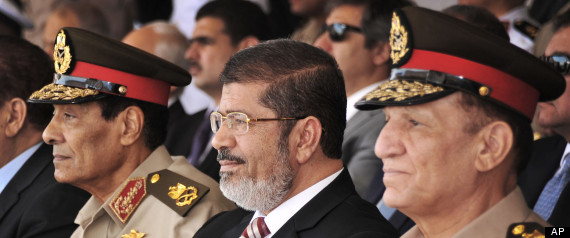
The communiqué announced by Egypt's Supreme Council of the Armed Forces, which was read over the Egyptian state television, echoed the same message of toppling former President Hosni Mubarak two years ago. The Supreme Council of the Armed Forces announced that President Mohamed Morsi has not adequately responded to the public's demands after the two-day ultimatum that was given to him. Cheers and celebrations rose up among millions of anti-Morsi protesters as Egypt's Supreme Council of the Armed Forces deposed the country's first democratically elected president and the U.S.-educated religious conservative, Morsi, who was elected president in June 2012. In addition, the country's top general issued a statement on Wednesday night that the head of the country's highest court is installed as an interim leader until a new president will be elected. Moreover, the Egyptian constitution which was written under the rule of Morsi and the Muslim Brotherhood has been suspended and the parliament has also been dissolved. As a result, a civilian interim council will be formulated until a new constitution can be drafted and a new president elected.
The major question raised among the Egyptians, as well as people and governments around the world, is whether the deposal of Morsi and the Muslim Brotherhood party can be characterized as a military coup or as a second revolution for democracy and economic reforms -- a phenomenon Egypt has been witnessing since the Arab uprising erupted across the region. Furthermore, speculation surrounds what the implications of the decision made by Egypt's Supreme Council of the Armed Forces will be, as well as which path the Egyptian people, its government, various parties and the army be taking.
Undoubtedly, the political tensions between the Muslim Brotherhood (led by former President Morsi) and the Egyptian army began immediately after Morsi was elected president and after the Muslim Brotherhood won the majority of the parliamentary seats. The new constitution diminished a considerable amount of political and economic power that the Egyptian military high officers and armed forced possessed. In addition, Mohamed Morsi granted himself sweeping powers which primarily exempted his decrees from judicial review until ratification of a constitution. Nevertheless, it is crucial to point out that a military coup is characterized as the overthrowing of a government solely by the power of military officers. Morsi's deposal, on the other hand, has been accompanied by millions of protesters who have been marching in the streets and occupying Tahrir Square for days. These people from various social groups have urgently demanded the Egypt's Supreme Council of the Armed Forces to take serious actions. As Mustapha, a 22-year-old Egyptian engineer student, explained, "This is what the majority of the Egyptian people want. It is not a military coup. These are demands of millions of people in the street."
After Hosni Mubarak's overthrow, Egypt's Supreme Council of the Armed Forces has been attempting to display little enthusiasm for returning to politics. This is due to their belief that their own prestige was severely tarnished by the chaotic year of street violence, instability and economic decline during the year after Mubarak's deposal and before Morsi's election.
The major grievances of the Egyptian people have been attributed to the incapability of Morsi and the Muslim Brotherhood to demonstrate an effective system of governance as well as to effectively address the country's high unemployment rate, economic catastrophe, fuel shortages, supply of basic needs such as wheat, dwindling hard currency reserves, and increasing sectarian conflict between the Sunnis and Coptics. In addition, the Egyptian people have repeatedly shown concerns about the increasing influence of Morsi's party and the Muslim Brotherhood in different branches and governmental institutions. Muhammad Morsi had been criticized of appointing many of the Muslim Brotherhood's members to high official positions, for instance.
On the other hand, the protests of millions of Egyptian people and the military's vow to intervene, depose Muhammad Morsi from power, suspend the constitution and dissolve the parliament raises speculation about whether Egypt's revolution would ultimately fulfill its objectives and promise to create a democratic system of governance at the heart of the Arab world. There are two implications of removing the party that won the popular elections from power. First of all, this decision can set off a resistance and backlash from the Muslim Brotherhood, which will then have an impact on the future economic and political stability in Egypt. Secondly, the disposal of a democratically-elected president might set the precedent for future instability in the country and demands to overthrow other democratically elected presidents when their popularity declines.
However, the currently most urgent need of the Egyptian people is having a stable, legitimate, and credible government capable of transitioning the state through competent governance and management of effective economic policies and reforms. The formulation of such a system of governance remains to be seen after army generals, the former United Nations diplomat Mohamed ElBaradei, youth groups and other coalitions can reach a consensus for the next Egyptian government.
This article was originally published in Alarabiya.
rafizadeh@fas.harvard.edu
@majidrafizadeh
